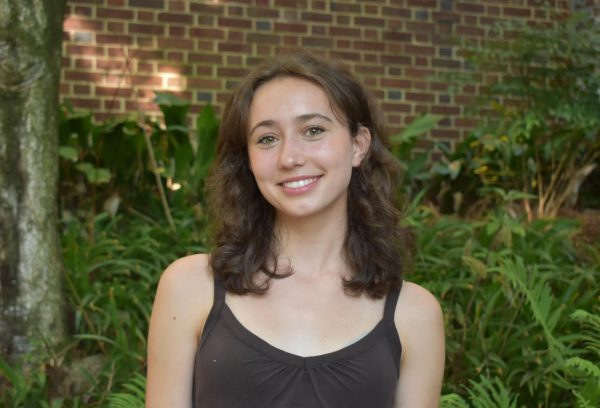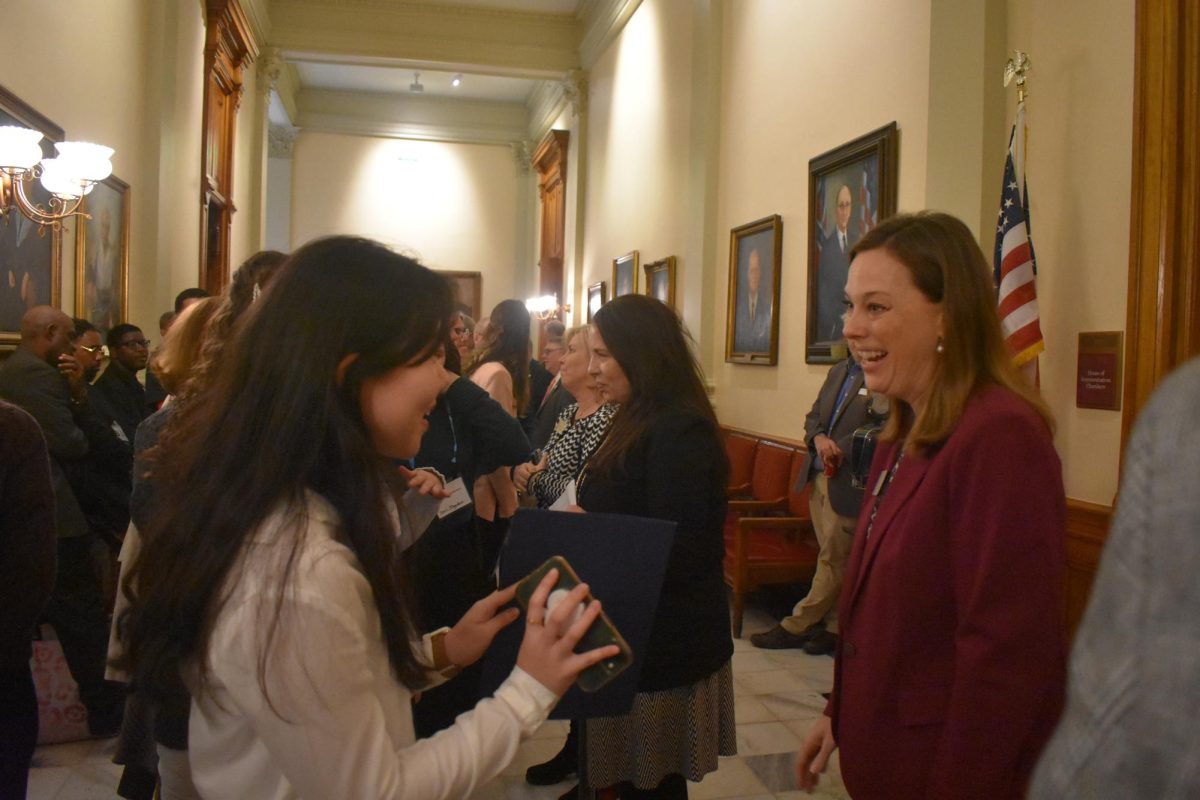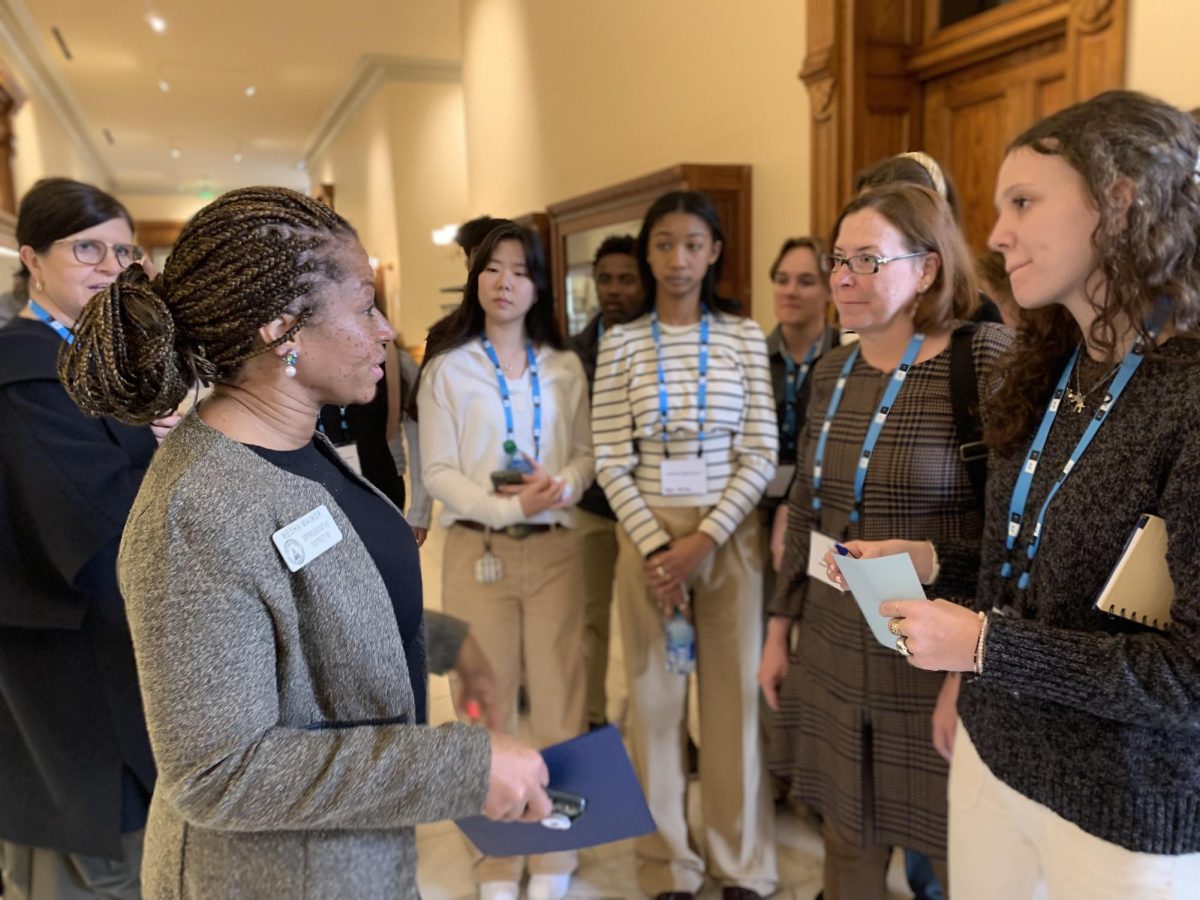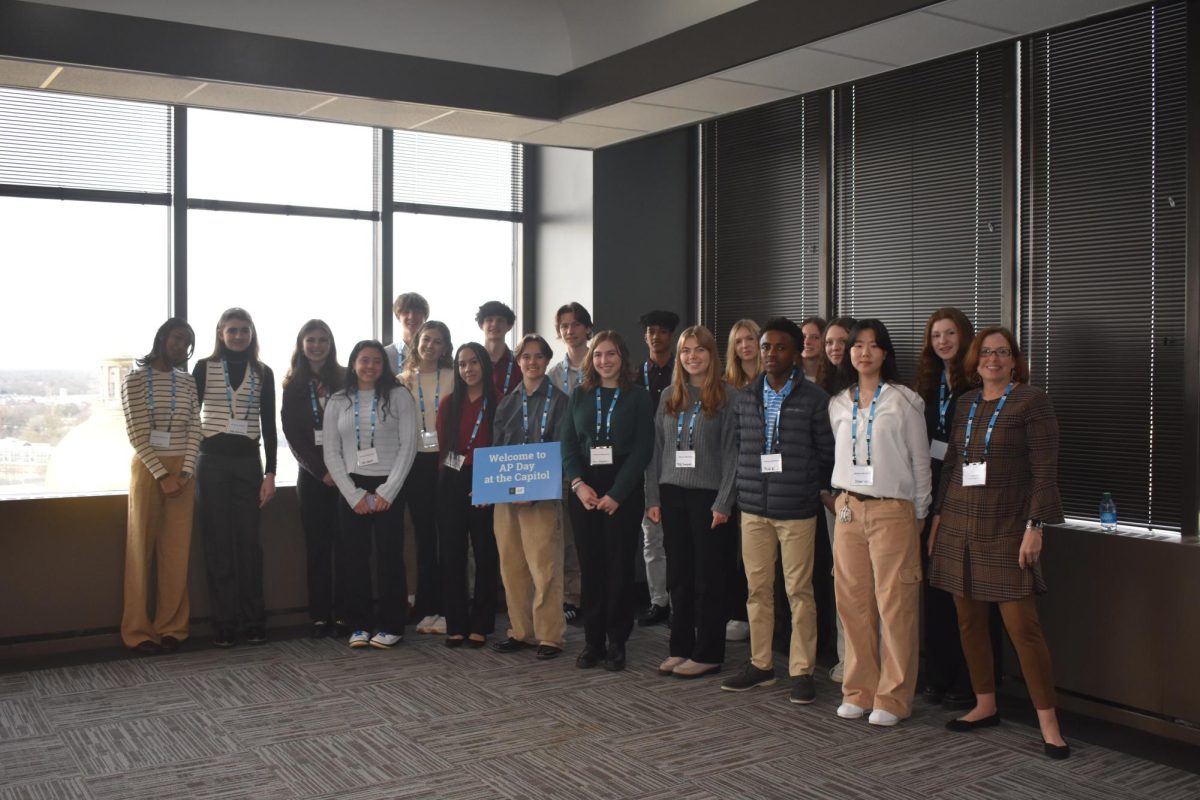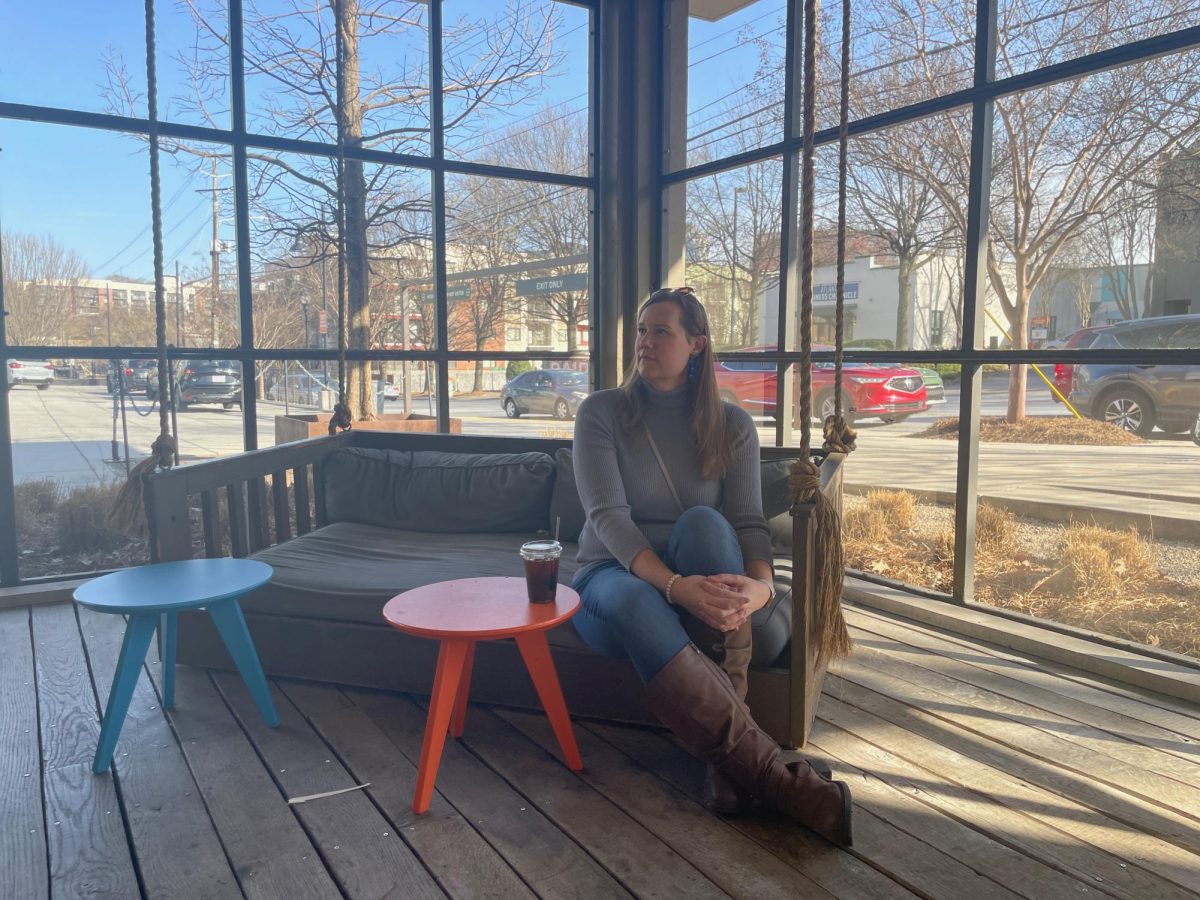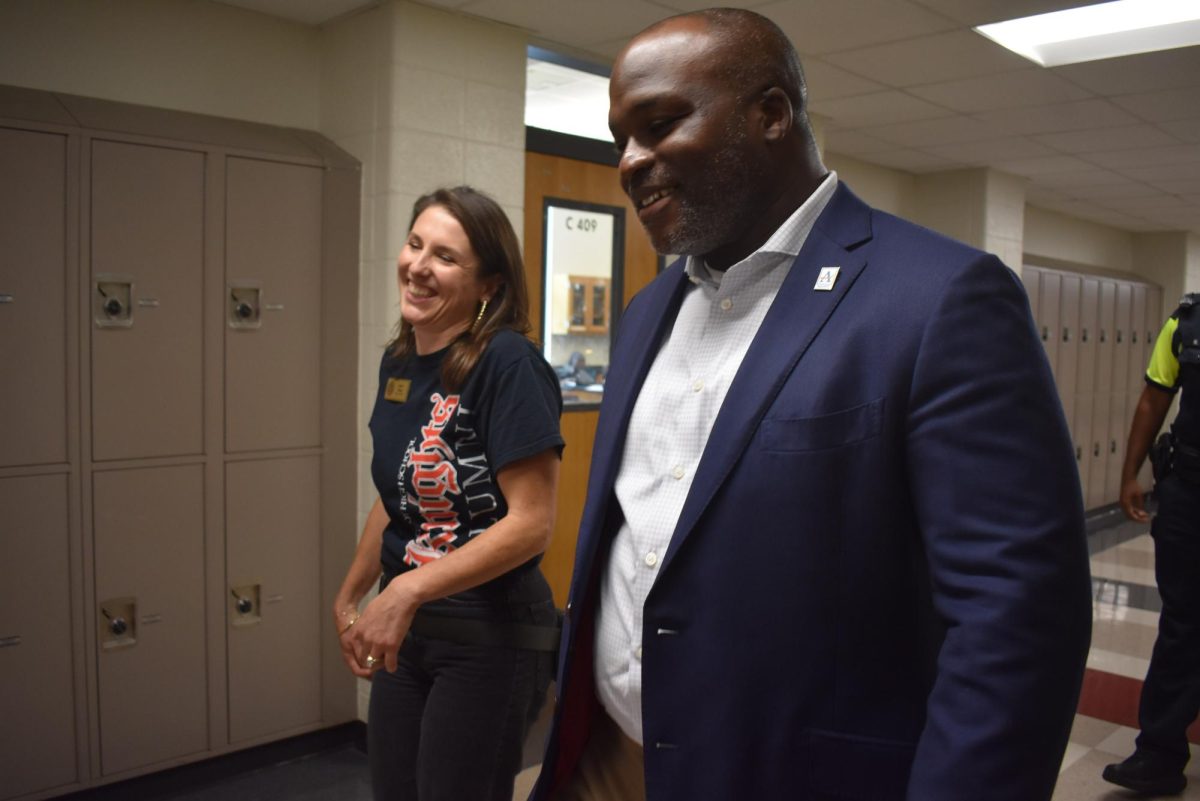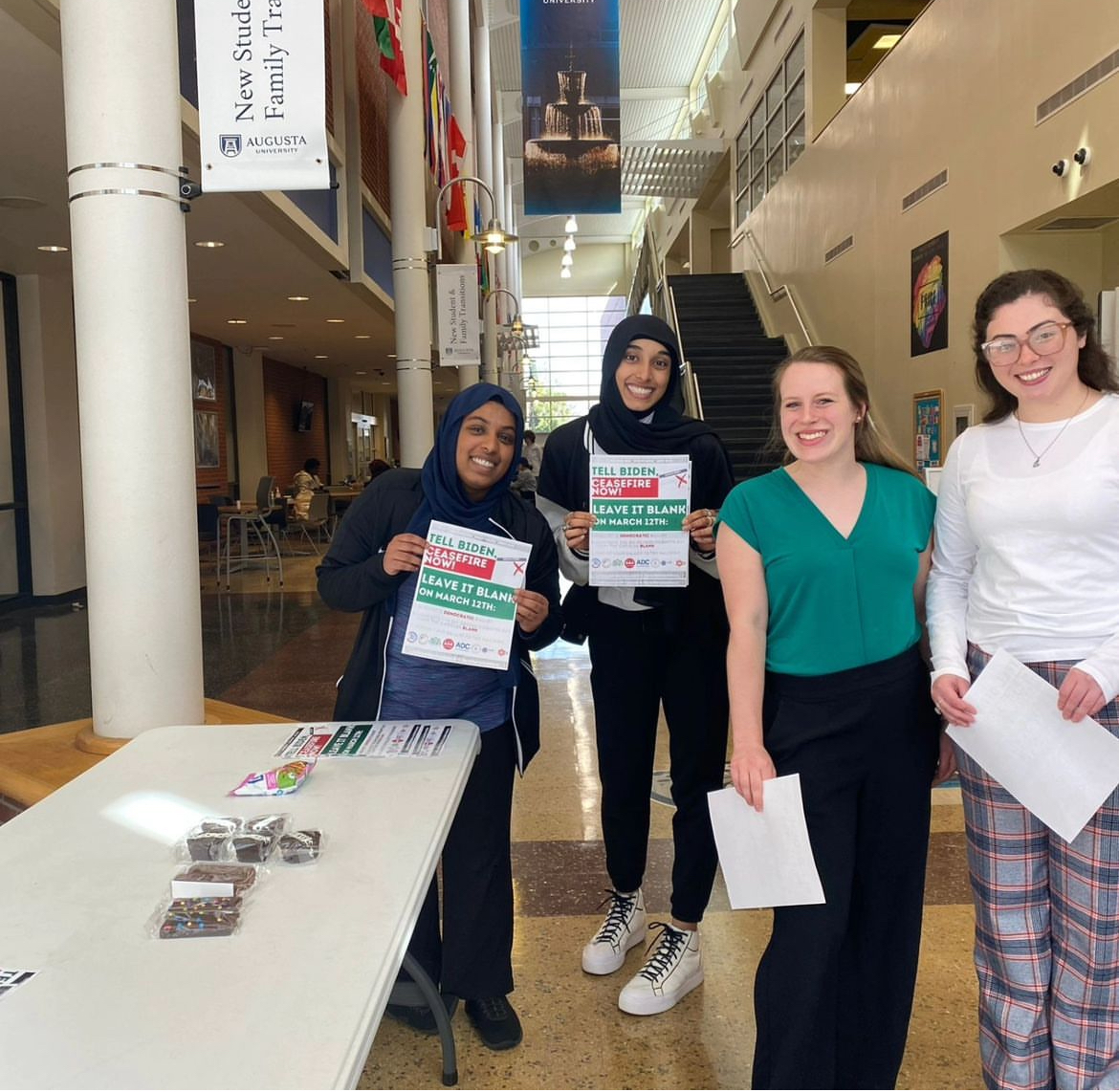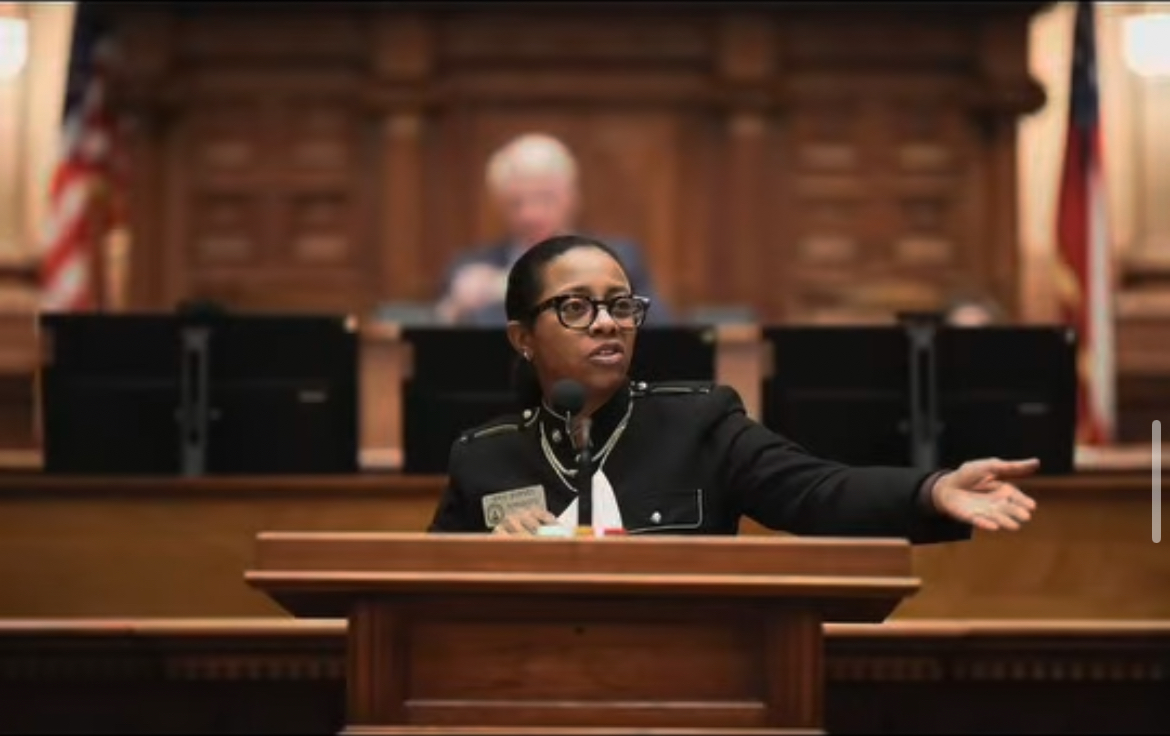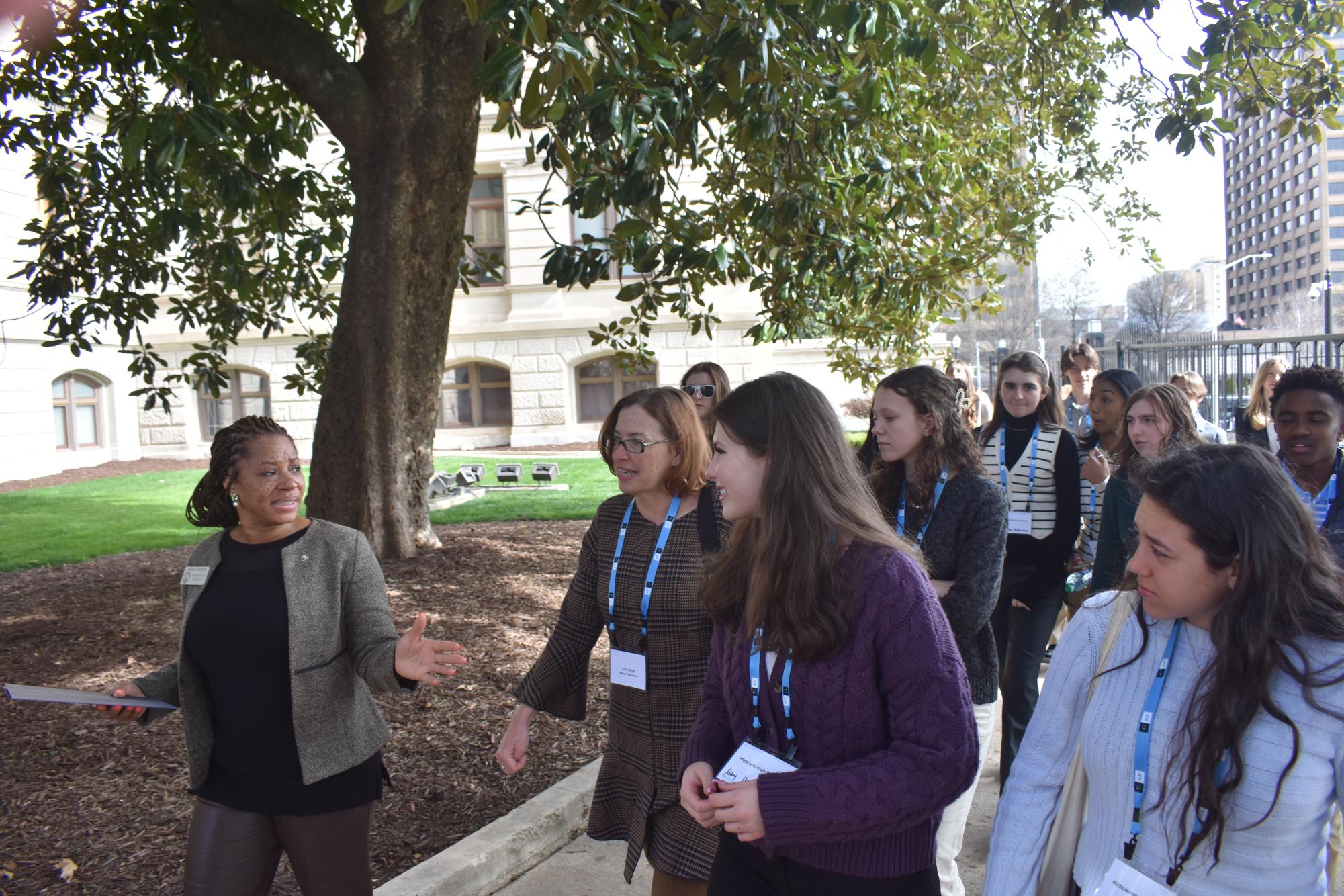
Representatives vote on youth-centric issues
Every year from Jan. 8 to March 28, state legislators make critical decisions for citizens as they pass laws in the session. The 2024 Georgia General Assembly is currently witnessing a surge of youth-centered legislative bills that are sparking crucial conversations between legislators, students, teachers and advocates about the future of education and equality in the state of Georgia.
Social studies teacher Jason Slaven believes it is important for students to understand legislative priorities that may directly impact them.
“These priorities affect us, and they change the way that we operate,” Slaven said. “It is really important for younger people to be aware of them so that they can recognize these systems of power, and recognize that if they see an issue, there could be a fix for that issue.”
Slaven said he frequently brings the topic of current legislative proposals into scholarly conversations in his classroom.
“These [laws] directly impact us [as] teachers and students,” Slaven said. “And a lot of times, it’s difficult to get any good, reliable news out of the legislature [and] to be able to see what these bills are, what they do and who [they] will specifically impact.”
Sen. Larry Walker III and 21 other Georgia legislators introduced Senate Bill 390, which aims to cut state affiliations with the American Library Association (ALA), the largest library system in the world that aims to promote library services, advocate for libraries and support the professional development of library workers.
Senate Bill 390 would prohibit public and private funds from being used for materials, services or operations offered by the ALA by library trustees, government entities or the Board of Regents of the University System of Georgia.
These proposed changes have raised concerns among educators about the potential impact on literacy development.
“One of the biggest pushes of the Georgia Department of Education for the last several years is focusing on literacy, especially early childhood literacy,” AP Capstone teacher Lisa Boyd said. “This bill stands completely in the face of that because one of the ways that we know to help students increase their literacy is to give them stories about people who are like themselves. When we start to limit the number of voices that can be represented, then we also limit the literacy of those people.”
Book legislation has remained at the juncture of political debate in Georgia with the enactment of bills such as Senate Bill 226, which was signed into law in 2022 and enabled Georgia parents to request books to be removed from libraries if their content was deemed as “material that is harmful to minors.” Most recently, community outrage was sparked after Cobb County Schools fired a teacher for reading a book to her students that discussed gender identity.
Legislators in favor of the bill claim the ALA president believes in “Marxist” ideology, one factor that influenced the bill’s proposal. Boyd believes Senate Bill 390 is an ineffective approach to promoting nonpartisan ideologies through literature.
“My biggest issue is that parents already have a lot of choices; they can decide that their children aren’t going to read a certain book,” Boyd said. “Why do we need it encoded in law? And why do we need to go after the largest library organization in the United States? [ALA has] really been a bedrock of American learning. It really seems like a political stunt.”
AP Literature teacher Susan Barber said the bill could have an impact on the availability of different literature in the Midtown media center.
“I think that [this bill] would limit funds for our own library, and that means fewer books or only a certain type of book; not a wide spectrum,” Barber said. “I think it’s detrimental to your education. You don’t have to – and no one should be forced to – read things. But people should have access to them.”
Barber said the state government’s separation from the ALA has the potential to exacerbate socioeconomic literacy inequalities.
“Reading is the root of why our democracy is built on people being able to read and think,” Barber said. “So, when we start eliminating access, people with money and power will find their own access, but people who don’t have money often don’t have the means to get their own access. So, libraries are essential for equity in all of us having equal access to literature and documents.”
Boyd said the bill will have more profound implications on rural students’ literacy rates than urban students.
“[Rural areas] probably don’t have a strong public library system and don’t have universities nearby; they don’t have different kinds of access to materials,” Boyd said. “I think the kids who are already, in many ways, behind in terms of exposure to ideas are going to be further behind. So, it’s going to increase the gap between the urban and the rural, which is a huge problem within Georgia.”
Boyd said she worries reduced access to ALA materials will inhibit student exposure to a variety of ideas through literature.
“There’s so much research that shows that reading about people who are different than the reader opens up avenues and an entire world of empathy,” Boyd said. “One of the things that we’re sorely lacking is empathy, understanding other people and being willing to even consider other people’s perspectives.”
Barber said collaboration between teachers and legislators could be an optimal approach to addressing concerns about suitable literature for students.
“How can we open doors and open avenues to have conversations with the experts on this who are … our librarians, our literature teachers [and] our history teachers?” Barber said. “Instead of excluding us from these conversations, how can you invite us in [and] how can we work together on this? Because clearly, not all literature is appropriate for all students of different ages … I just feel like we’re two different groups of people fighting for the same thing, but not having any conversations about what the right thing is.”
Sponsored by state representatives Sandra Scott, Kim Schofield and Viola Davis, House Bill 5 proposes to require the University System of Georgia and the Technical College System of Georgia to provide free menstrual hygiene products for students in certain facilities of their educational institutions.
Menstrual equity advocates like Hattie Carter, a senior at the University of Georgia and president of student-led menstrual equity nonprofit organization Period Project, believe the introduction of House Bill 5 is essential in supporting menstruators in Georgia.
“We consider ourselves a first-world country [and] one of the greatest innovators in the world, yet we cannot provide a basic hygiene need to the menstruators of our population,” Carter said. “It’s just incredibly frustrating because how can we call ourselves so developed if we can’t provide a basic need?”
Madison Shelnutt Stop Taxation on Menstrual Products board member and former senior adviser for Project Red UGA said there is a large prevalence of period poverty across Georgia’s universities and schools.
“Period poverty is everywhere, anywhere that poverty exists,” Shelnutt said. “I know in UGA, there was a survey done by [nonprofit] organization Project Red to survey the needs on campus, and about a third of the respondents – or about 2,000 respondents – said purchasing products had been a struggle for them before. Just providing basic [menstrual] necessities in bathrooms is the same as if you were to provide toilet paper or paper towels; these are things that we expect to be in a bathroom.”
Senior Sydney Matthews, aMidtown Votes board member, believes the bill would improve menstrual equity in Georgia colleges, given the large demographic of lower-income students enrolled at public universities.
“The majority of people who go to public universities are often lower-income, and menstrual products are very expensive,” Matthews said. “So, I think that this [bill] is a great step towards accessibility for lower-income individuals, as long as there’s women, in general, who are at public universities.”
Shelnutt said House Bill 5 is an important step in giving access to education for menstruating students.
“Almost all, if not all, menstruators have been in a situation where we’ve been out in public and needed a product and weren’t able to access one,” Shelnutt said. “Even though it’s super important to have products available for people who can’t afford them, it’s also important just because you might have to miss class if you don’t have a product because you forgot it, and so, it is hindering our education.”
Matthews said enacting House Bill 5 could aid in normalizing menstruation for students while at school.
“[House Bill 5] destigmatizes menstruation by making it more accessible, instead of having this feeling of shame, sneaking around to get products or having to ask someone to buy them for you,” Matthews said.
Shelnutt said the bill signals the necessity of providing menstrual products to menstruators in educational settings.
“I think it’s definitely paving the way and making a statement that these products are necessary to be in institutions,” Shelnutt said. “Especially with UGA, or [other] big universities, I think that [menstrual products] should be included in that not just for their students or for their faculty, [but] for any staff. This is something that would just make [menstruation] a lot more equitable for everyone who visits campus. And I think that filing this bill definitely brought awareness to higher-ups that this is something that people were asking for.”
However, Carter believes there will be obstacles to implementing the proposed bill in ensuring that Georgia students have equitable access to menstrual products.
“I think it’s not going to be equitable,” Carter said. “There’s immediately going to be an issue of firstly including trans people, or non-binary individuals, and trying to incorporate them into the plan of rolling out free menstrual products. You’re going to have to fight tooth and nail with any institution in Georgia to even admit that those people deserve access to healthcare-related things.”
Carter said passing House Bill 5 has vast implications in mitigating period poverty among students.
“If it does happen, and it’s able to roll out smoothly, and we’re able to collaborate with the people at the university and easily integrate this company [Period Project] that we have now … then it would be incredible, and it would help so many people,” Carter said. “I mean, it would be something that genuinely would improve at least the menstruators on campus, their quality of life, and you can’t really beat that.”
Carter said student advocacy has played a pivotal role in encouraging youth-centered legislation such as House Bill 5.
“It shouldn’t be our role [to advocate],” Carter said. “I am a college student. I’m pre-med. I am finishing up all of my prerequisites right now. I’m taking the MCAT in May. On top of all that, I’m having to run an organization to provide menstrual products to a university that refuses to buy menstrual products for their own students, despite the fact that there is a need. It makes me frustrated sometimes because I think that if we’re not the ones lobbying, it’s not going to happen.”
Senate Bill 351, the “Protecting Georgia’s Children on Social Media Act of 2024,” is seeking to reduce usage of digital platforms during school, with several provisions, including new curriculum and parental consent.
The bill currently only has partisan support of the Republican Party, which AP Literature teacher Lisa Boyd believes makes students subject to partisan opinion.
“It seems very ambiguous,” Boyd said. “It seems like the law is playing to parents in the same way that the book-banning laws are playing to parents, that parents control decisions about their children. I don’t think the details have been thought out; the ideas are there because it’s a nice political message for a conservative message. But, I don’t think it’s like the details are there.”
Boyd believes social media needs to be regulated in the classroom because of the dependency students have on their phones, but also recognizes the benefits access to technology can bring.
“I think technology, when we can harness it and use it effectively, is useful,” Boyd said. “It’s important for students to have access to more cutting-edge issues, and current news and those kinds of things that are vital for their education. The problem right now in terms of teaching and learning is that teachers end up spending way too much time policing students’ phones, and what they’re doing in class, and students are spending way too much time distracted by their phones, especially their social media accounts.”
Junior Emmie Snead said the parental oversight included in the proposed bill will limit personal freedoms of students.
“I think for the kids with parents that are strict and don’t let them use social media, [the bill] is going to kind of take away a lot of their freedom with their phone,” Snead said. “Then the kids whose parents don’t care about that kind of thing, who might not be as strict with grades and are less restrictive parents, I think they might grant [parental consent], it just depends from one person to another. I do think in the long run, it’s going to limit a lot of students’ abilities to talk to their friends to make plans, or just use their time how they want to use it.”
One part of the new legislation is implementing a new curriculum to educate students on social media by local school boards for the 2025-26 school year. School board member Katie Howard said it is important to teach these skills from a young age.
“We’ve seen it working in some other school systems, [because it]incorporates life skills around using social media into a life skills course and curriculum,” Howard said. “ Also making sure that teaching students from a very early age with social-emotional learning the importance of respecting each other, acknowledging differences, how to work through problems, conflict resolution, and the dangers of putting things out on social media, is really [important to teach] through social-emotional learning.”
Snead believes the added curriculum would not be effective and eat into valuable instructional time.
“I don’t think it’s going to be a very good use of our time,” Snead said. “I believe if a student wants to be on their phone, they’re going to find a way even if you tell them to get off their phone. You take class time away from teaching when talking to the class about social media, I feel like that would just be a little bit pointless, because if a student cared that much, they would probably already know the positives and negatives of it.”
Additionally, the bill aims to revise cyberbullying laws. Howard believes the district needs help correcting this nationwide issue in the district.
“[Bullying] is an issue nationwide that needs to be addressed,” Howard said. ”School systems throughout the nation are struggling with how to educate students on the importance of not participating in cyberbullying, how dangerous it is for everybody, and what it can lead to. It is an issue that we need help with in APS, all school systems do.”
The bill also includes potential disciplinary measures if students or school personnel violate the social media policies. Howard believes the measures should be more focused on preventative actions.
“I am always concerned about not addressing the root cause of things that are done, and just being punitive,” Howard said. “Right now, the focus is educating and addressing root causes. The resources, like having a team that’s specialized in this, are on schools to understand how to identify potential threats or things that are going on and educate students about the use of social media and cyberbullying and all these things. That’s where I focus on the disciplinary piece. School systems do have autonomy around these things, but I see where the state is trying to crack down on something. I’m not saying we shouldn’t take it seriously. But we need to be more preventative than reactionary.”
Howard said the bill has important points, but they need to be implemented in a way that allows for the benefits of social media to be used.
“With this bill, I think there are some important things that are brought up,” Howard said. “It’s just how we go about addressing those things with oversight and accountability without unnecessary overreach and providing systems with the support they need to best support their students and also not potentially hamstringing the use of social media for things that are good.”
In the current legislative landscape of Georgia, student advocacy has emerged as a force that has influenced discussions and decisions made on key bills on education and social issues.
Junior James Howard, a member of Midtown Votes, emphasized the importance of understanding government processes and the impact of voting.
“It’s important to be involved in the government,” Howard said. “The only way we can really interact with our government is through voting, and so understanding where your vote goes is important.”
Slaven said effective communication between legislators and youth is essential to enacting legislation that benefits youth.
“It’s incredibly important for students to be able to understand what’s being proposed, and to be able to advocate for themselves and talk to the elected officials,” Slaven said. “These legislators are just regular everyday people that have been elected. With that being said, they are not omnipotent – they can’t know everything at once. So, it takes students communicating their experiences with these officials for them to understand how to address the issues.”
Boyd said it is critical that teachers uplift the voices of their students in standing up for adequate legislation.
“I think educators, ironically, are often the least listened-to voices,” Boyd said. “When legislators are making choices about educational bills, they are much more apt to listen to parents and even students. As an educator myself, I think one of my most vital roles is to help students become advocates for themselves. When I get legislators who are really fired up about an idea or a concern, it’s when I take students to the state capitol, take students to go be part of that conversation, and then [legislators] really listen.”

